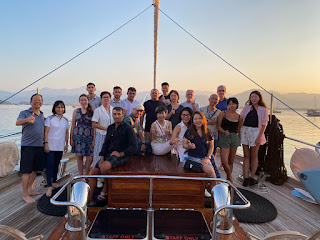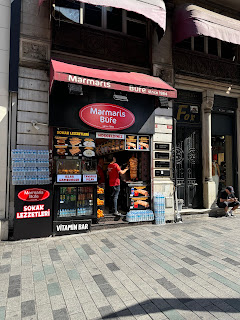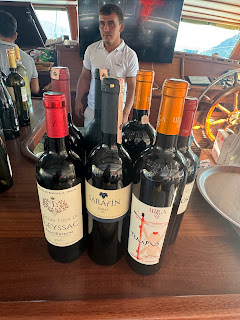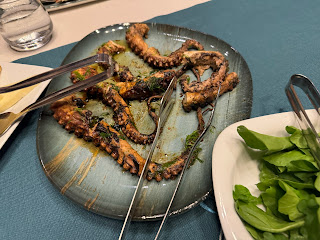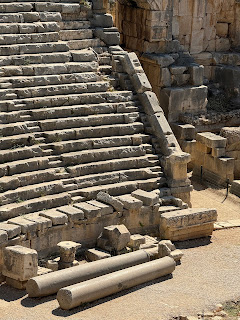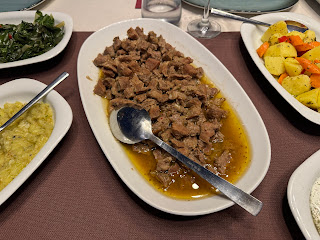At the break of dawn, the boat slipped away from Kas, setting course for the enigmatic Butterfly Valley. The sea, wild and unyielding, greeted us with a relentless vigor. The vessel heaved and rolled, as if rebelling against our passage. Seasickness claimed many in our group, their faces drained of color, caught in the sea’s merciless grasp. The hours crept by, the waves oblivious to our suffering, until at last, as the sun climbed higher and the day stretched on, the sea’s fury began to abate. By midday, the tempest had quieted, a tenuous calm settling over us. It was only then, as the boat steadied and the horizon softened, that the pallor lifted from our faces, allowing us to slowly rediscover the joy of our journey.
Once berthed at Butterfly Valley, the sun was high above the Mediterranean’s turquoise waters, casting harsh, sharp shadows across the deck. In just two days, we would turn our bow back toward Fethiye, and three days hence, onward to Istanbul. Istanbul, with its bustling bazaars, the air thick with the scent of spices, and the timeless pleasure of wandering its streets—these simple joys awaited us, yet I found myself both eager and reluctant to leave the sea’s embrace behind.
This journey has been more than a mere passage through landscapes; it has woven us into the very fabric of time, linking us to the ancient worlds that once thrived along these shores. Sailing the Mediterranean, with the same winds that guided the ancients filling our sails, has been a highlight, but it is the land that has spoken to us in a profound and lasting way.
As I walked through the ruins of Laodicea, I stood in awe of what remained of their wealth—two grand theaters, side by side, silent witnesses to a city once vibrant and opulent, now merely a whisper in biblical verses. It is one thing to read about such places, but quite another to stand amidst the dust of their ruins, feeling the echoes of history reverberate beneath your feet.
Colossae, though still largely entombed beneath the earth, revealed its secrets in a different manner. Kneeling by a stream, I let the cold water trickle through my fingers, finally grasping what Jesus meant by cold and hot in the context of Laodicea. The stark contrast between life-giving cold water and the tepid indifference He warned against was no longer an abstraction, but a tangible reality I could feel and understand.
Saint Augustine’s words rang true: “The world is a book, and those who do not travel read only one page.” To witness how others live, to momentarily step into their world, is to stretch the boundaries of our existence. Travel, as Emerson suggested, transforms the mind, leaving it forever altered, unable to revert to its former dimensions.
And here, in Turkey, I have witnessed the resilience and determination of its people, especially on the waters. As evening fell and the sun dipped below the horizon, we found ourselves in a crowded bay, with no place to anchor. Three times, the anchor slipped, leaving us adrift. Yet our captain, steadfast and unflinching, would not relent. The process was precise—first, a scout in the dinghy searched for a place to secure the ropes. Then, the gulet carefully reversed into position. One rope was tied, then another, until finally, we were secure.
Once anchored, the crew seamlessly shifted into a new rhythm. Dinner was served without a murmur or hint of complaint, despite the lateness of the hour. It was nearly 9 PM. The crew, I thought, must have been exhausted, yet my wine glass was refilled with a smile. This, I realized, was service beyond expectation, here on the deck of the Larin Su.By 11 PM, fatigue overcame me, and I collapsed into sleep, the gentle rocking of the boat lulling me into a deep, dreamless rest. In that quiet moment, the world seemed to shrink and expand at once, the weight of history and the simplicity of the present converging. It reminded me that travel is not merely a luxury, but a vital means of living a fuller, richer life.


